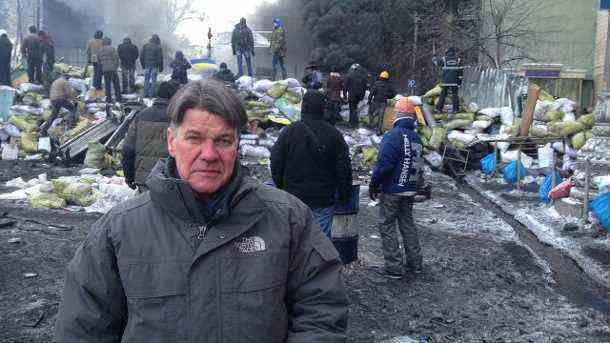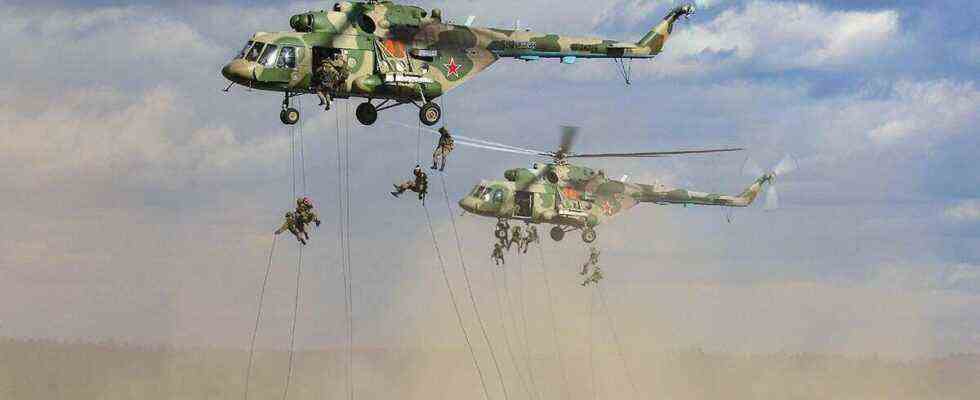As an ARD correspondent for Russia, Udo Lielischkies was very close to Vladimir Putin for 20 years. The Kremlin expert analyzes the current crisis on the border with Ukraine. He paints a gloomy picture.
After massive Russian troop deployment on the border with Ukraine the West fears that Russia could attack the neighboring country. The government in Moscow denies any plans to attack, rejects criticism of the troop movements and, for its part, accuses Kiev and NATO of provocations. It was not until December 28 that the Russian Foreign Ministry warned the Western military attachés of an armed conflict. But how realistic is a war?
In the opinion of Udo Lielischkies, former long-time director of the ARD studio in Moscow, Russia’s demands are unattainable: no recordings of new NATO members, no military cooperation between the USA and former Eastern Bloc states, no cooperation with regime-critical groups in Russia.
Udo Lielischkies reports live from the Victory Parade in Volgograd in 2013: Seventy years earlier, the German troops in what was then Stalingrad had surrendered. (Source: WDR)
“So steer these unfulfillable demands towards a deliberate failure of negotiations, so that the Kremlin has a pretext for military intervention? “asks the internationally renowned Russia expert Cologne. Lielischkies is certain: “A Russian invasion of Ukraine would mean a long and very bloody war.” Although the Ukrainian army is still far inferior to the Russian one, it is still significantly stronger than it was a few years ago.
“Return of the injured and dead would be unpopular”
Equipped with American Javelin anti-tank missiles, Turkish drones, with great combat experience and, above all, due to the expected massive resistance of the Ukrainian population, a conquest would probably be a very loss-making undertaking, according to Lielischkies. In addition: “The return of numerous injured and dead people to Russia would certainly be extremely unpopular among the Russian population. The approval ratings for Putin are already significantly lower than in earlier times.”
According to Lielischkies, Putin’s previous experience with the use of force speaks in favor of the Kremlin’s readiness for war: Whether Crimea or Eastern Ukraine – the Europeans would have reacted rather hesitantly each time and tried to get back to dialogue quickly. “Self Nord Stream 2 was built after the annexation. This hesitation has certainly encouraged the Kremlin. “
Russia could lose Ukraine out of sphere of influence
Putin could also see the time for an invasion as very favorable: The United States is predominantly preoccupied with China and is also in a dramatic domestic political crisis. Europeans are as divided as ever. At the same time, the Ukrainian Prime Minister has now massively opposed Russian influence in his country, arrested a friend of Putin and had three Russia-friendly TV channels shut down. “This threatens to completely lose Russia and Ukraine from its sphere of influence, also due to its accelerated westward course – an unacceptable idea for Moscow.”
 Lielischkies is in 2014 in Kiev – right in the middle of the Maidan. (Source: WDR)
Lielischkies is in 2014 in Kiev – right in the middle of the Maidan. (Source: WDR)
The Kremlin has cut itself off from the population
Like many other observers of the explosive situation, Russia expert Lielischkies believes that the high economic costs of an invasion must be made clearer to Moscow than before. “Nord Stream 2 will then have no chance.” The other threatened sanctions should also include a shutdown of the international payments system SWIFT.
Russia is currently still benefiting from high raw material prices, but is characterized by a decaying infrastructure, falling real wages and growing dissatisfaction among the population with their living situation.
In his book “In the shadow of the Kremlin. On the way in Putin’s Russia” the journalist conveys an authentic picture of the country: the center of Moscow as a spaceship disconnected from the rest of the country, a glittering, cinematic panopticon of newly rich self-expression.
Most of the vast country, on the other hand, the real Russia, is dark, run-down and forgotten, according to Lielischkies. “A huge country that pays the price for the life of a small, very rich, very cynical elite that benefits from the Putin system.”
USA must stand by Europe
For Lielischkies it is now clear: Even if US President Biden finds the conflict very inconvenient, he must devote himself to it with all intensity. “In contrast to his predecessor, Biden has repeatedly emphasized the great importance of the transatlantic alliance. And of course he is aware that the Europeans are far too weak to stand up to these aggressive acts of the Kremlin on their own,” says the former correspondent who worked for the ARD studio in Washington for several years and reported on US politics.
Has on Sunday President Biden talks to Ukrainian President Volodymyr Zelensky about the conflict – and continues to rely on diplomacy. According to information from Washington, Biden reiterated US support for the sovereignty and territorial integrity of Ukraine. A White House announcement said that Biden had given assurances that the US and its partners would react “decisively” if Russia invaded.
Biden emphasized the principle of “nothing about you without you”, which envisages the involvement of Russia in diplomatic relations. Biden continues to rely on talks. He supports de-escalating measures in the Donbas region.
Representatives of Russia and the USA plan to meet in Geneva on January 9th and 10th. The western defense alliance NATO is also planning a meeting with the Russian side on January 12th. The day after, there is to be a meeting of the Organization for Security and Co-operation in Europe (OSCE).
Another step towards an authoritarian state
For Lielischkies, this is a logical, but nevertheless dramatic, step by the Putin regime Prohibition of the human rights organization Memorial. Memorial was the pillar of the Russian human rights movement, founded to come to terms with the crimes of the Soviet dictatorship. Putin is thus taking another step towards the transfiguration of the Soviet Union, the end of which he described as “the greatest geopolitical catastrophe of the last century”. “With the memorial ban, Russia is moving from an authoritarian to a totalitarian state.”
In eastern Ukraine, pro-Russian militias and the Ukrainian army have been fighting each other since 2014 after Russia annexed the Ukrainian peninsula of Crimea. In the conflict, Moscow supports the separatists who have proclaimed so-called People’s Republics in Luhansk and Donetsk. In total, more than 13,000 people have already been killed in the fighting.

